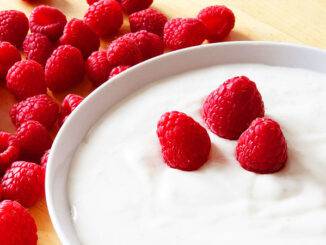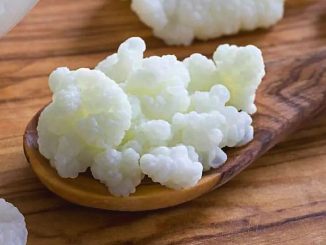
Fermented dairy products (a.k.a. cultured dairy products) had been made since ancient times, when raw milk from cows, sheep, goats, or horses was preserved by spontaneous fermentation. Most of the time, this fermentation occurred naturally with the appearance of lactic acid bacteria in milk.
While buttermilk, sour cream, and yogurt were longtime perceived as the most common fermented dairy products, some lesser-known products like milk Kefir are recently gaining momentum throughout the world.
A common characteristic of all fermented dairy products is that their fermentation leads to the conversion of lactose into lactic acid. In ancient times this increased acidity of fermented milk products inhibited the growth of putrefactive bacteria and extended their shelf life.
Fermented foods are also known as functional foods as, due to the probiotic bacteria they contain, they have many benefits beyond essential nutrition.
They are known to improve appetite, have a laxative effect, and also eliminate heavy metals and toxins from our bodies. Fermented (or cultured) dairy products are renowned for improving digestive processes, reducing the risk of developing inflammatory bowel diseases (IBS), and are used to treat lots of health conditions related to the gastrointestinal tract.
Fermented milk products are valuable sources of vitamins (B, D, K2) and nutrients (calcium, magnesium, phosphorus) responsible for the health of the bone tissues, normalization of the immune system, and dampening any allergic reactions.
An essential advantage of cultured dairy foods is that they are absorbed much faster and easier than plain milk. In addition, these products are ideal for people with lactose intolerance because fermentation converts lactose into lactic acid, thus making the dairy product well tolerated by lactose-hypersensitive people.
Fermented dairy products are also vital for the health of the skeleton and bones because of the considerable amounts of calcium and other minerals they contain.
Most of them also contain Tryptophan, a precursor for “the hormone of happiness” called Serotonin. So, daily use of Kefir or yogurt will not only help you maintain the right balance of your guts microbiome but will also help you fight depression and anxiety.
Fermented dairy products have numerous confirmed health benefits. According to scientists, regular consumption of these products (taking into account a few considerations) not only improves the functioning of many systems of the human body but even prolongs life.
Main types of fermented dairy products
Buttermilk, sour cream, yogurt, and cheeses are among the most common fermented dairy products in the Western world. Still, recently Kefir made a serious breakthrough with its considerably more powerful probiotic and nutritional content.
Buttermilk
Buttermilk is the most simple fermented dairy product. Traditionally, buttermilk was the liquid left after churning butter out of cream, and lactic acid-producing bacteria in it were naturally occurring.
In modern times, milk gets “artificially” inoculated with lactic acid bacteria, resulting in commercially available cultured buttermilk. Another variant of buttermilk is the so-called acidified buttermilk, a simple substitute made by adding an acid such as vinegar or lemon juice to separate the whey from the cream.
The nutritional and probiotic values of buttermilk are relatively modest, and in the Western world, it is mainly used for cooking. However, it is still widespread in India, Nepal, Pakistan, Turkey, and some Arab countries.
Yogurt
Yogurt is the best known of all fermented dairy products and the most popular worldwide. Usually, whole milk is used for making quality yogurt, and it is inoculated with Lactobacillus delbrueckii subsp. bulgaricus and streptococcus bacteria. The most distinct characteristic of yogurt is that the bacteria used for its fermentation (Lactobacillus bulgaricus and Streptococcus thermophilus) are thermophilic, meaning they “like” higher temperatures. That’s the reason why the fermentation of yogurt requires temperatures between 45.6 and 46.7 °C (114 and 116 °F).
Yogurt holds the same level of protein and fat as the milk from which it is produced but is also a valuable source of calcium and vitamins B2, B6, B12, and probiotic bacterial strains. Like other fermented milk products, yogurt is primarily cultured from cow’s milk but can be made from goat’s or sheep’s milk.
High-quality yogurt is dense, homogeneous, and sometimes flavored by adding fruit, berry, and other aromatic additions.
Sour cream
While historically, sour cream was made by simply letting cream sour on its own, nowadays, it is prepared by artificially inoculating cream with a lactic acid bacterial culture. Because it is essentially made of cream, sour cream has a fat content between 10% and 14% and is widely used in baking cookies, cakes, bread, and pies. When sour cream results from direct, natural fermentation, it improves bowel function, relieves constipation, and cures chronic bronchitis.
Cheese
Cheese is the most widespread and nutrient-rich fermented dairy product due to the abundant presence of protein, minerals, and vitamins. More than one-third of all milk produced in the United States each year goes into fabricating different types of cheese.
Cheese is easy to digest and has an average of 250 calories per 100 grams of the product. Over 2 000 types of cheeses exist, some of the most popular of which are cheddar, Greek feta cheese, Bulgarian white cheese, goat cheese, blue cheese (or Roquefort), Italian Mozzarella, French Camembert, and many others.

Cottage cheese is especially popular among adherents of weight-loss diets and people suffering from liver disease, hypertension, and atherosclerosis. Cottage cheese “miraculously” helps dissolve fats in the human body and strengthens the skeletal system, increases the level of hemoglobin, and has a healing effect on the nervous system.
Kefir
Finally, Kefir is the oldest and most beneficial of all cultured dairy foods. It is prepared with kefir grains (SCOBY), a symbiosis of primarily lactic acid bacteria and yeast.
Kefir typically contains up to 50 different beneficial bacteria and yeasts, considerably more than any fermented dairy product.
Kefir is the most diverse source of potent probiotics with a long list of beneficial effects on our health.
By normalizing, balancing, and stabilizing the microbiota of the guts, Kefir improves digestion and relieves constipation, acts as a robust immune system modulator, has powerful antibacterial properties, controls cholesterol levels and blood pressure. Kefir also has an anti-carcinogenic effect, inhibits the symptoms of allergies and asthma, improves the appearance and health of the skin, and can even help with weight loss.
Kefir is easily absorbed and quickly gives the sense of satiety, but it is also beneficial for anemia and decreased appetite. That is especially true for older people, in whom the digestion process is generally more sluggish and needs a boost to work as required.
Kefir is an irreplaceable addition to any diet after treatment with antibiotics or during rehabilitation after serious illnesses.
Since Kefir enhances the excretion of fluids from the body, it is helpful for overweight people and those suffering from diabetes, kidney, and heart disease.
One of the most noticeable features of Kefir is its ability to serve as a base for an endless list of byproducts. We can use Kefir for making kefir smoothies, kefir ice-creams, kefir cookies, kefir pancakes, kefir bread, and, of course, kefir cheese.

Kefir can also be used as a base for making cheese. There are two ways of making cheese from Kefir: with and without applying additional heat to Kefir.
Either way, the cheese made of Kefir has most of the nutritional values of most widespread cheeses while adding the extra benefits of the probiotics contained in Kefir. You can find on our website both recipes for making Kefir cheese without heating and Kefir cheese with the application of additional heat to separate the whey from the curd.
Some precautions in using Kefir are advised only for people suffering from increased gastric acidity or suppressed immune system.



